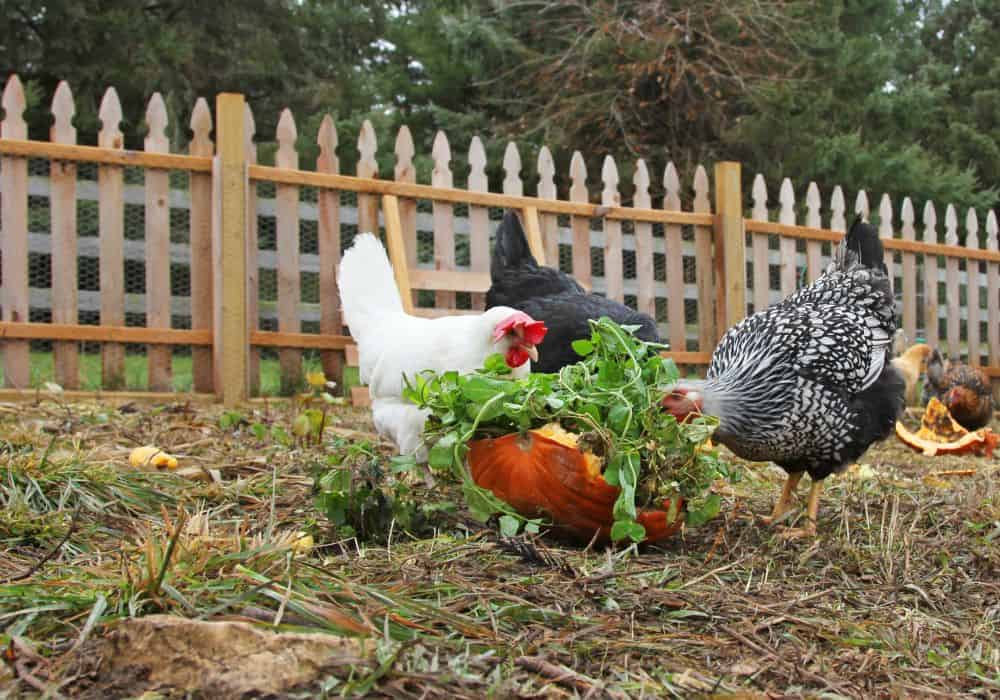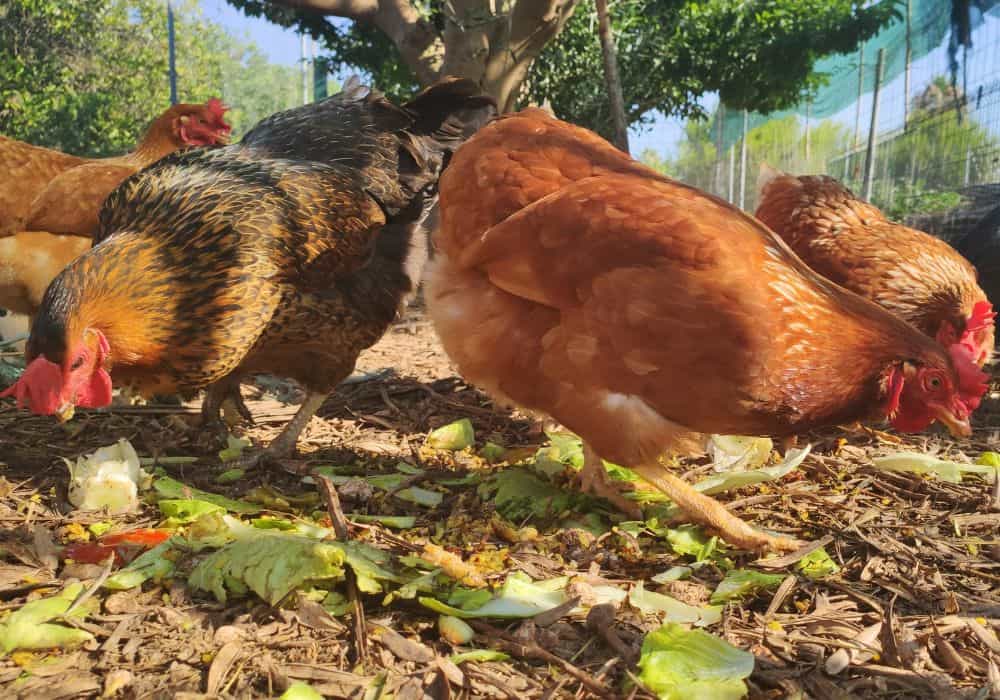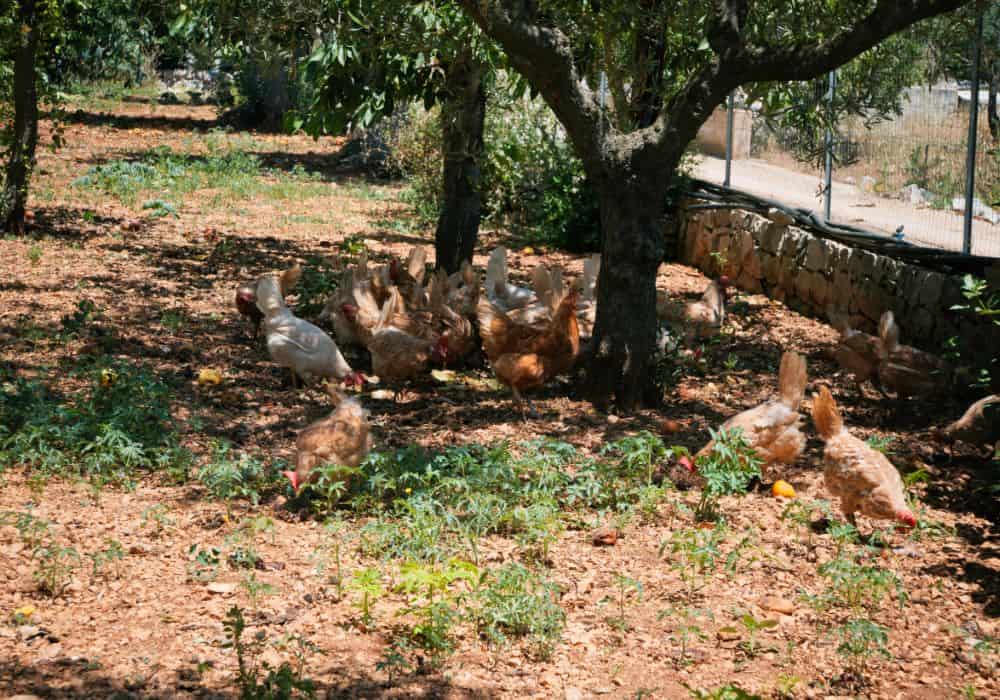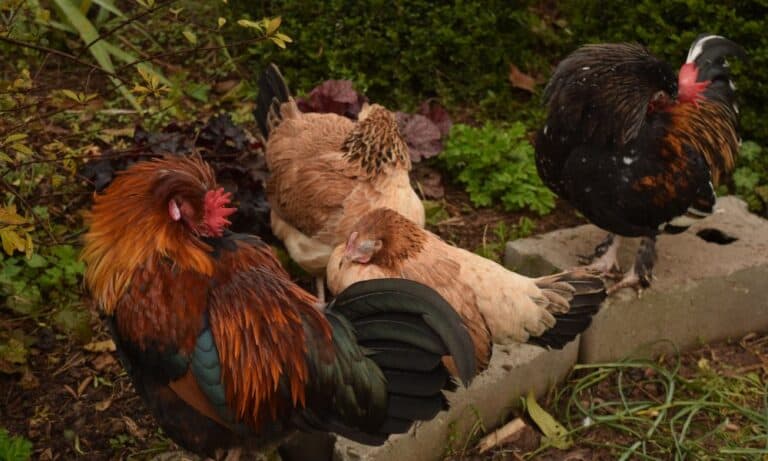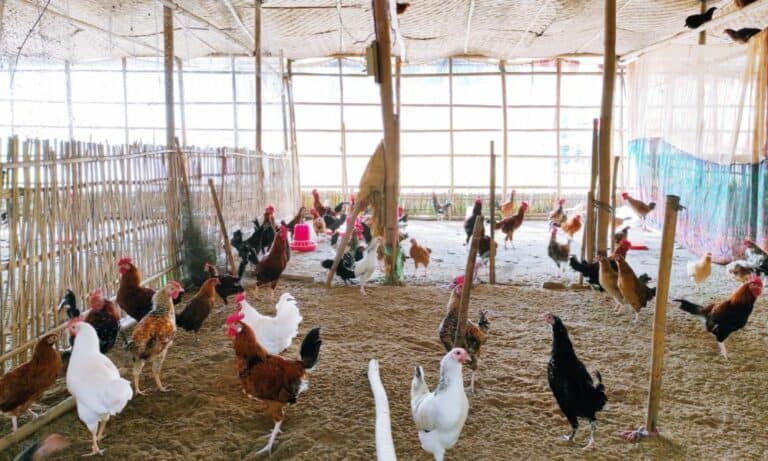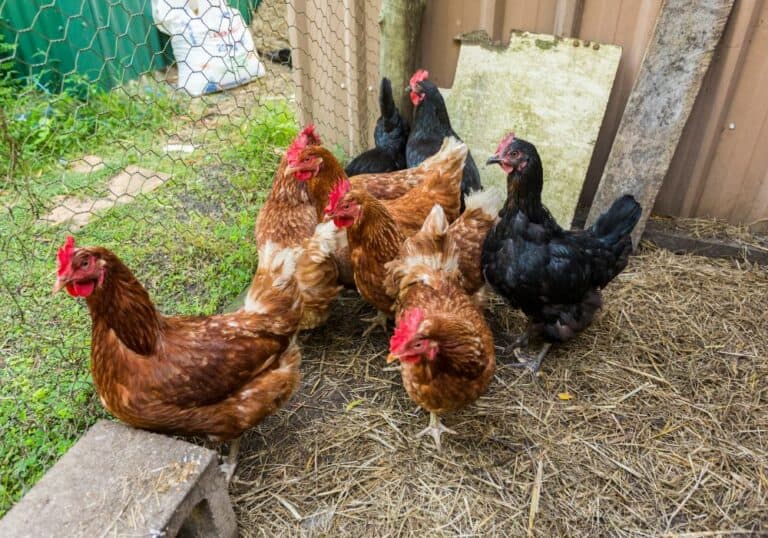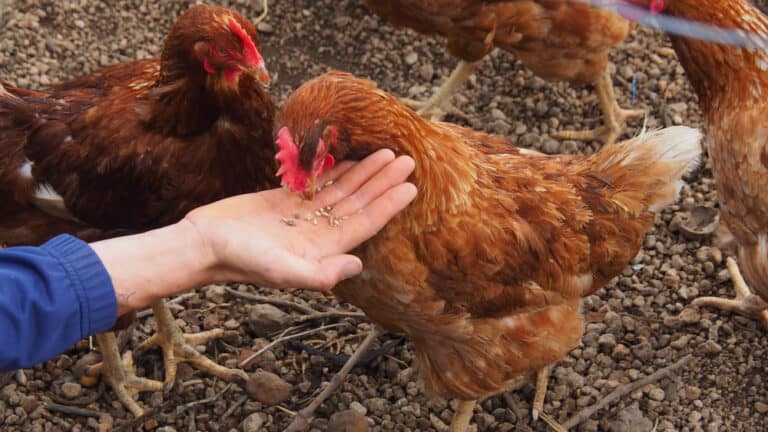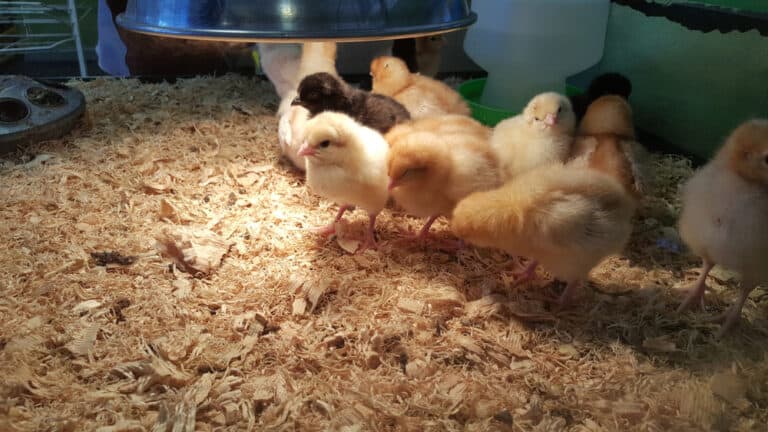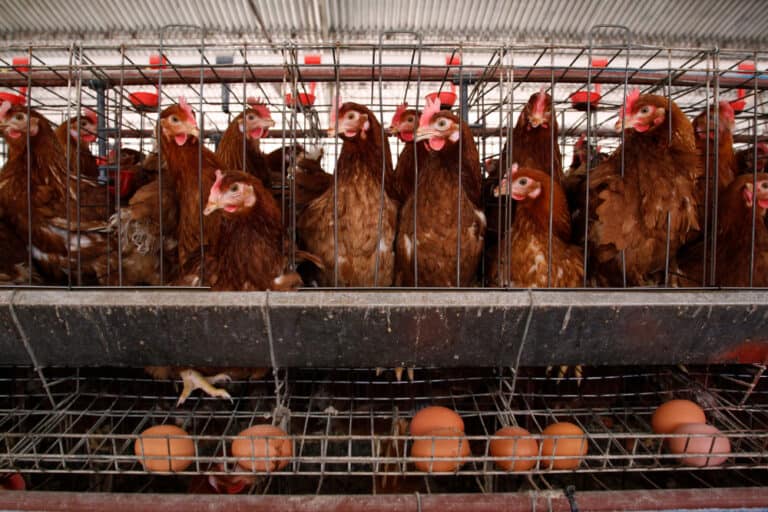Kale is slowly becoming a crowd-favorite superfood, whether in trendy smoothie bars or in humble crop gardens. This leafy green vegetable is rich in vitamins and nutrients that provide many health benefits, so you’ll always see it in someone’s salad or breakfast plate.
But kale isn’t beneficial for humans only. Its numerous vitamins, minerals, and antioxidants are also helpful for growing strong, healthy chickens. But the question is—can chickens eat kale? Is it toxic for them, or completely safe to consume?
Today, we will give you the lowdown on whether it’s a good idea to feed kale to your chickens, their potential benefits, and different ways to serve it to your flock. Keep scrolling to learn more!
What Do Chickens Typically Eat?
Before we answer the question “Can chickens eat kale?” let’s first talk about what a regular chicken diet looks like.
Chickens are known to be omnivores, which means they eat both plants and meats. They need a little bit of both to be as healthy as possible. A deficit of either of these food groups can lead to weakness and other health issues.
Domesticated chickens and those kept in poultry farms are usually fed commercially produced feed. This feed is made with pellets of grains, vitamins, and minerals to give the flock the nutrients they need to grow strong bones and feathers and produce high-quality meat and eggs.
Free-range chickens that are free to roam around the farm also delight in foraging their own meat and proteins. Some of their favorite fares include insects, bugs, and small animals like frogs and mice. It is said that they will eat pretty much any invertebrate that they catch.
Chickens can also eat fruits and vegetables, especially those that are soft, leafy, and won’t injure their beaks when they try to peck at them. Some plant-based foods you can feed your chickens are cabbage, Swiss chard, watermelon, cucumbers, bananas, beets, cauliflower, and many others.
But how does kale fare in this long list of nutritious fruits and veggies?
Can Chickens Eat Kale?
The simple answer is yes, chickens can definitely eat kale. It is very safe for them to eat because it is a leafy veggie. Some other organic foods—like pineapple—aren’t as easy to peck at because of the tough outer skin. But because kale is easy to chew and bite off, it causes no such problems.
Kale is rich in vitamins A and C, magnesium, flavonoids, fiber, manganese, and other nutrients that are good for your chickens. We’ll talk about their benefits in-depth later, so keep reading!
It also doesn’t have any known toxins, so you can toss an entire bunch of kale to your chickens and let them eat the whole thing. If you’re worried about your smaller chickens choking on the stems, you can cut those parts off, too.
To ensure that your kale is 100% organic, we suggest growing it on your own in the garden. It’s super easy to grow and is known to withstand tough climatic conditions.
You can grow and feed your chickens different types of kale, like dinosaur kale, curly kale, and even red Russian kale to see what they like best.
Wondering what other crops and vegetables you can grow in your garden to feed your chickens as a treat? Watch this video to learn about 12 easy-to-grow crops your chickens will love:
You can also save on time and get them at your local grocery stores, where they’re likely readily available. However, make sure to wash the leaves before serving them to your chickens. That way, you can rest assured that it doesn’t have any pesticides or dirt on it.
How Much Kale Should You Feed Your Chickens?
Although kale provides a lot of extra nutrition to chickens, it must make up only 5-10% of their diet. Most of their intake should still be their feed, which is specially formulated for the healthy development of chickens.
Kale is meant to be given to chickens only as a treat or a once-in-a-while snack after a hard day’s work at the farm. And you don’t always have to toss them a large bundle of kale—sometimes, a few leaves are more than enough.
Even if your chickens love eating kale, make sure that it’s not the only thing you feed them. If they don’t get enough grains, meats, and other plant-based food, they might end up with nutrient deficiencies and become sick. So, it’s important to give your chickens kale in moderation.
Feed your chicken flock a bit of kale around two or three times per week only. The rest of the time, treat them to a variety of foods, from their regular feed to other yummy vegetables like broccoli, carrots, turnip greens, and pumpkins.
The Many Health Benefits of Kale for Chickens
1. It increases your chickens’ hydration levels
One thing a lot of people don’t know about kale is that it’s made mostly of water. A whopping 84-90% of kale is water, so it increases your chickens’ hydration levels. This contributes to them maintaining a good body temperature and boosting their metabolism.
Of course, the best source of hydration is still water—kale is just supplementary to this. Make sure to let your chickens drink a ton of water to cool them down on particularly hot days on the farm.
2. It lowers the risk of heart disease
Kale is rich in polyphenols, flavonoids, vitamin E, and beta-carotene. These are all antioxidants that improve heart health and keep inflammation down, which lowers the risk of heart disease and cardiovascular troubles.
Antioxidants are also fantastic at protecting chickens’ bodies against damage from free radicals—a source of heart complications.
Another way kale lowers the risk of heart disease in chickens is by lowering bad cholesterol. Kale boosts the production of bile acid in the body, which in turn breaks down fatty food that could increase bad cholesterol. As a result, your chickens can have stronger, healthier hearts.
3. It boosts your chickens’ immune system
Kale is an excellent source of vitamin C, which is known to boost the immune system. With stronger immunity from diseases and viruses, you don’t have to worry about your flock getting wiped out by an unexpected illness. It also makes their response to health vaccines better.
Chickens are exposed to many germs and bacteria on the farm. Aside from keeping your coop clean and tidy, you can also help your chickens defend themselves against sickness by feeding them vitamin C-rich foods, like kale.
4. It improves blood clotting and wound healing
Have you ever had problems with chicken injuries, whether from chicken fights or predator attacks? If your answer is yes, then you know how stressful it is to help your chickens heal from wounds. Kale can help a lot with that.
Kale is high in vitamin K, which is terrific for blood clotting, and consequently, wound healing. This vitamin stimulates the proteins needed to bind calcium and stop bleeding after a lesion. That way, your chickens won’t bleed as much when they’re hurt, and they can focus on recuperating.
5. It regulates digestion
As with many green, leafy vegetables, kale is high in fiber, which is known to regulate digestion issues like irregular bowel movements, constipation, and diarrhea. If your chicken flock is prone to suffering from digestion issues, think about adding kale to their regular diet to help manage it.
6. It promotes good vision and eye health
Kale contains vitamin A, lutein, and zeaxanthin. These antioxidants are excellent at keeping oxidative damage at bay, particularly in the eyes. They help prevent macular degeneration in older chickens, which helps keep their vision in good condition even as they age.
Fun fact: kale has the highest lutein content out of all vegetables. You can tell that your kale has tons of lutein if it has a dark green color.
7. It strengthens the bones
This green leafy vegetable is also a great source of calcium, which is known to improve bone health and strength in chickens and humans alike.
And aside from maintaining healthy bones, calcium also promotes healthy, sturdy eggshells. That makes kale an excellent snack for female chickens who have the task of laying eggs for the farm.
8. It contributes to weight maintenance
Last but not least, kale is terrific for giving your chickens a yummy treat without worrying about weight gain. Kale is low in sugar and fat, so you never have to worry about it making your chickens gain too much weight.
Obesity is a huge risk for chickens that are fed table scraps and fatty meats. It is also a prominent cause of sudden chicken death syndrome in young birds that have so much fat in their diet, and consequently, their heart and liver.
By giving chickens healthy snacks like kale that don’t result in unhealthy weight gain, you lower their risk of muscle weakness, heart, and respiratory disease, and having a sedentary lifestyle on the farm.
Different Ways to Feed Kale to Your Chicken Flock
There are many ways to serve kale to your chickens. Here are some simple and creative ways to do so if you want to change it up from time to time:
1. Chop up some fresh kale
Raw, uncooked kale is high in nutrition, so it’s a great idea to serve it as is to your chickens. The easiest way to serve fresh kale is by tossing the whole bunch of leaves on the ground for your chickens to gobble up.
But if you’re worried about the kale stems choking your chickens, you can go the extra mile and chop up the kale into thin, small pieces. You could also just crush the leaves up in your hands to break them apart into tiny bites. That way, your chickens don’t have to strain to chew the kale.
2. Hang up the kale for them to peck at
An entertaining way to feed kale to your chickens is to hang the leaves up somewhere the chickens can access and watch them peck at it. Tie the kale up on a low bush and watch the flock nibble at and share the kale.
You could also simply hold up the kale to feed them. Here’s how it looks when you hold out kale to feed to your hungry chickens as a treat:
3. Cook the kale to kill bacteria
If you’re concerned about the bacteria and preservatives in your store-bought kale and want to make it as safe as possible for your chickens to eat, you can cook it first. Cooking kale softens its texture, making the stems easier for even baby chicks to chew. It also- improves the taste.
Note, however, that while cooking kale kills a lot of the bacteria on it, it will also make it lose some of its nutrients. If you grow your own kale and are sure that it’s organic, it’s best to skip cooking this vegetable and feed it straight to the flock so that they can get as many of its nutrients as possible.
4. Put the kale in their chicken feed
You can also throw some kale into your chickens’ regular feed. Just remove the leaves from the stems and toss them into a blender. Pulverize the leaves, take them out, and mix them into the chicken feed before serving it to the flock in their feeder.
Try not to do this with cooked kale, which is moist and can make the feed wet and unappetizing for the chickens.
Conclusion
All in all, kale is an excellent, nutrient-dense vegetable to give your chickens as a treat. As long as their diet still comprises mostly of their chicken feed, the occasional leaf of kale is a terrific addition to their meals.
Kale has plenty of benefits for chickens, from boosting their immune system to improving blood-clotting and eye health. These are important health benefits that will give them a higher quality of life and make their life in the coop much healthier and more productive.
Got any other questions about kale and other vegetables that your chickens might like? Don’t be shy—leave them in the comments below and we’ll try to get back to you as soon as we can! Together, we can learn more about the superfoods that can benefit our chickens’ overall health.

